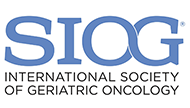 Written by Fay J. Strohschein & Allison Weins
Written by Fay J. Strohschein & Allison Weins
The Canadian Association of Nurses in Oncology (CANO) held their 2020 Annual Conference virtually from November 6-8. Despite the disappointment of not being able to gather in Victoria, British Columbia, conference planners actively worked to foster engagement among CANO members in a virtual platform. Attendance was exceptional, with many frontline oncology nurses, who may not have been able to travel for an in-person conference, being able to engage in the online sessions. Given that there was only one-stream for this 2-day conference, there were fewer sessions than for typical conferences. Several sessions led by Oncology & Aging Special Interest Group members were included, giving visibility to issues and concerns related to oncology nursing care of older adults with cancer and their families.
Morgan Stirling and Allison Wiens presented their experiences and lessons learned implementing G8 frailty screening, awareness of deprescribing and a process for providers to provider potential deprescribing recommendations at CancerCare Manitoba. Using a quality improvement lens, their work highlighted the importance of engaging patients and stakeholders at all levels of clinical care and measuring the changes. Findings highlighted the need to pivot, focusing on improving organizational awareness and working to embed frailty screening in existing clinical processes, rather than scaling the initial initiatives. Although the use of blue bags to promote medication review had to be put on hold due to the pandemic, this successful practice will restart as soon as restrictions allow.
On behalf of the Canadian and International position statement development teams, Fay Strohschein, Martine Puts, Lorelei Newton, and Rana Jin had the opportunity to present the draft Canadian and international position statements to strengthen oncology nurses’ voices in optimizing care of older adults with cancer and their caregivers. Conference participants actively engaged in the session, providing valuable feedback on the position statements via chat. The overall engagement and specific comments affirmed the relevance of these statements for CANO members.
The key role oncology nurses can, and do, play in the treatment decision making process among older adults with cancer was highlighted in Fay Strohschein’s presentation of her thesis work concerning processes of treatment decision making among older adults with colorectal cancer.
In addition to these sessions specifically related to the care of older adults with cancer, other sessions also had clear implications for the care of older adults with cancer and those close to them. The keynote speaker, Dr. Sally Thorne, presented on “Nursing in Uncertain Times: The Art of Being a ‘Nuisance,’” highlighting oncology nurses important advocacy role. No where is this more important than in the care of older adults with cancer and their families. Carrie MacDonald-Liska and Karine Bilodeau, co-chairs of the Survivorship Special Interest Group, introduced the new CANO Survivorship module, which includes a chapter specific to older survivors. Additional sessions, such as those related to the clinical nurse specialist role in oncology, the use of patient reported outcomes, effective communication, COVID-19 and cancer, moral distress, transitions from oncology to primary care, telehealth, remote symptom support and triage, and a smartphone app for coordinating nursing respite care for families with cancer also had important implications in caring for older adults with cancer and their families.
With the conference being virtual, organizers made presentations available beyond the conference dates. Session recordings are available online until May 31, 2021, for a registration fee of CAN $50/$25 for students.
For further infromation, please visit: https://www.cano-acio.ca/event/canoacio2020


